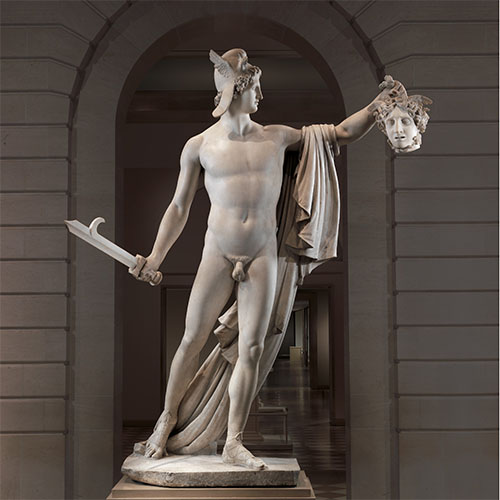
I WAS IN LOVE with museums before I even visited one. My parents had a small, battered brown suitcase filled with art postcards from London, Paris, and all across Belgium, where they lived for five years after World War II. They never spoke much about surviving the Holocaust, and the hundreds of postcards filled that silence for me. Europe was art back then, not death and destruction, and I communed with those images as intently as someone deep in prayer. Sitting on the linoleum-covered floor in front of them, I could have been one of those guys in a science fiction movie opening a mysterious box whose unseen contents give off an unearthly and mesmerizing glow.
My Washington Heights bedroom had an unobstructed view of the George Washington Bridge. Watching its lights come on at dusk was one of my quiet joys, as soothing as poring over these photos of statues and paintings.
But nothing prepared me for the revelations on my first visit to the Metropolitan Museum of Art. As a fan of ancient Greek history and Greek myths in elementary school, I was immediately drawn to the galleries of Greek and Roman statues. I already sensed I was different from my classmates. I was electrified by the bold nudity on one pedestal after another, bathed in tender natural light from above, or so it seemed, and lit up more by their own perfection.
With my parents off in some other gallery, I wandered and stared and studied—and who could accuse me of anything unwholesome or dangerous? I felt safe there, sheltered, wordlessly embraced.
It was a much later piece, though, that changed my life: Canova’s Perseus. At the time, this statue loomed on a landing at the top of a mammoth staircase, its placement making the space around it feel like an altar.
I was shy then, bookish, easily bullied, and living in the shadow of an older brother who seemed to get all the attention I craved. I relished the Perseus, would have gulped it down if it were a drink. Easily three times my size, Perseus was graceful, cool, triumphant as he held Medusa’s grotesque head away from himself. His strength, his beauty, and yes, his perfect nude body, filled me with longing not just to be him, but to create something, anything.
I returned to him on each visit, engrossed, inspired, and many years later wrote a story in which he figures as an icon of gay desire.
Every statue from the ancient world that I’ve encountered since that day reminds me of the discovery of such unparalleled beauty and the nascent discoveries of self that waited for me in my teens.
I’ve even felt Perseus’ power at Tate Modern, wandering through an exhibition of Brancusi statues which couldn’t have been more unlike Canova’s work, but their beauty triggered vivid memories of his. It made me cry, which alarmed the nearest guard. I muttered something about being overwhelmed and wandered off.
 Born and raised in New York City, Lev Raphael received his MFA in Creative Writing and English from the University of Massachusetts at Amherst. His first book Dancing on Tisha B’Av won a Lambda Literary Award and he’s authored 26 other books in genres from memoir to mystery. His fiction has been widely anthologized in the U.S. and Britain. He has been invited to teach creative writing and American Studies at Leipzig University in 2023. Learn more about him at writewithoutborders.com and levraphael.com.
Born and raised in New York City, Lev Raphael received his MFA in Creative Writing and English from the University of Massachusetts at Amherst. His first book Dancing on Tisha B’Av won a Lambda Literary Award and he’s authored 26 other books in genres from memoir to mystery. His fiction has been widely anthologized in the U.S. and Britain. He has been invited to teach creative writing and American Studies at Leipzig University in 2023. Learn more about him at writewithoutborders.com and levraphael.com.






Discussion1 Comment
Going off to google Canova’s Perseus.